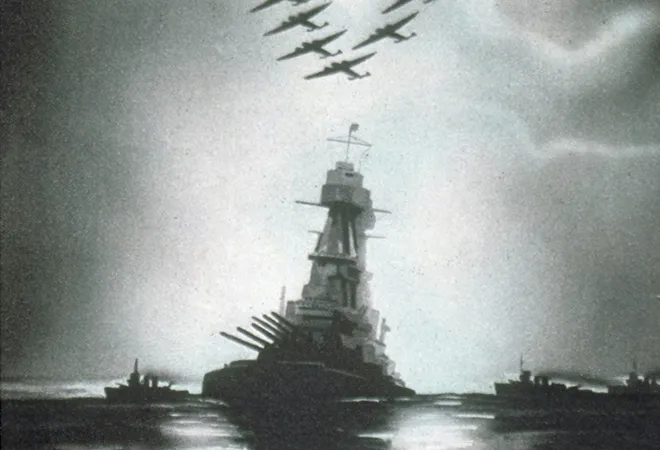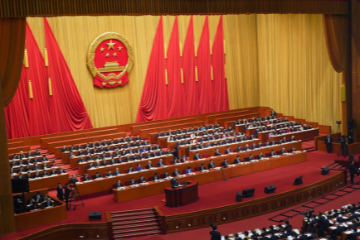
After the recent Maldives-US defence pact, though between two friendly nations, India may have to consider the medium and long-term implications of the possible over-crowding of the neighbourhood strategic space in the Indian Ocean. In the immediate context, however, the loud silence of jailed former president Abdulla Yameen’s opposition PPM-PNC combine to the US pact has exposed his camp to being anti-India for the sake of being one. Or, is he playing the ‘China card’ of his regime days, still?
Titled the
Framework for US Department of Defence-Maldives Ministry of Defence: Defence and Security Relationship “sets forth both countries’ intent to deepen engagement and cooperation in support of maintaining peace and security in the Indian Ocean, and marks an important step forward in the defence partnership.” Maldivian Defence Minister Mariya Didi, on a private visit,
signed the pact with Reed Werner, the US Deputy Assistant Secretary of Defence for South and Southeast Asia, at Philadelphia, on 10 September, according to a US Department of Defence statement.
Werner and Didi also “agreed to work toward scheduling the first Defence and Security Dialogue. Both sides reiterated their commitment to a free and open Indo-Pacific that promotes the security and prosperity of all nations in the region,” the release said a couple of days later. The “Framework outlines a range of bilateral activities, including “senior-level dialogues, discussions, engagements and opportunities in areas such as maritime domain awareness, natural disasters and humanitarian relief operations,” the statement added, without details.
The loud silence of jailed former president Abdulla Yameen’s opposition PPM-PNC combine to the US pact has exposed his camp to being anti-India for the sake of being one. Or, is he playing the ‘China card’ of his regime days, still?
The American statement quoted Minister Didi as saying that the “Defence and Security Relationship will add immense value to the excellent US-Maldives partnership defined by shared principles and interests in peace and security of the Indo-Pacific and IOR amid rising threats like piracy and terrorism.” She tweeted that the agreement was “an important milestone in defence and security co-operation between the US and Maldives.”
Shelved SOFA
Long before the Framework agreement, the US had offered the ‘Status of Forces Agreement’
(SOFA) draft to then President Mohammed Waheed Hassan Manik in 2012-13. Waheed had replaced duly-elected predecessor Mohammed Nasheed, now Parliament Speaker, who quit in the face of a joint opposition protest.
Coming in the footsteps of the
low-profile ACSA (Acquisition and Cross-Services Agreement) that the Nasheed government had signed while in office (2008-12), a leaked draft indicated that SOFA would allow US troops to carry personal weapons on and exempt them local laws and courts on Maldivian territory. Under ‘nationalist’ pressures, Maldives shelved SOFA. Incidentally, the US’s offer of a Framework Agreement/SOFA to Maldives’
Sri Lankan neighbour is pending Colombo’s decision.
It was learnt that the ‘consultation’ — if it was one — was not at appropriate levels. Because the pact did not materialise, nothing more was said or heard.
Incidentally, the 2013 SOFA plan threatened to upset India-US relations after US Assistant Secretary of State Robert O
Blake claimed that Washington was ‘transparent’ with New Delhi in the matter, and was ‘consulting’ them. It was learnt that the ‘consultation’ — if it was one — was not at appropriate levels. Because the pact did not materialise, nothing more was said or heard.
Self-righteous protestation
Now the Yameen camp’s silence on the US defence pact has caused eyebrows to raise nearer home and intrigued the diplomatic community. Fireworks were anticipated, given their self-righteous ‘nationalist’ protestations that caused the exit of the Indian infra major
GMR Group through Nasheed-Waheed transition. More recently, his camp launched an ‘
India Out’ campaign, with pictures of Indian soldiers with the tricolour, asking Indian military’s helicopter pilots and technical personnel to leave.
Since his presidential days, the Yameen camp’s professed demand was for India to
take back the two gifted helicopters and call back its Navy/Coast Guard personnel. In this background, and also given the 2013 SOFA experience, the expectation was for the Yameen camp to oppose the US pact, anticipating American boots on Maldivian soil, some day.
The expectation was for the Yameen camp to oppose the US pact, anticipating American boots on Maldivian soil, some day.
This has raised questions if the Yameen camp’s opposition is only to Indian neighbour’s long-term commitment and continuing contributions to the archipelago-nation’s all-round development
vis a vis the China-funded projects under his regime. As is known, the
multifocused India aid programme, under the incumbent government of President Ibrahim ‘Ibu’ Solih, focuses as much on creating social and societal infrastructure as on the nation’s
largest infra project in the $400 million, 6.7 km, Male-Thillafushi sea-bridge.
Referring to the Yameen camp’s ‘India Out’ campaign, Maldivian Foreign Minister Abdulla
Shahid recently said that they felt threatened by the numerous India-aided projects. “To say in modern terms, they simply cannot ‘digest’ the fact. We will not stand by (and let their words affect us)… The relationship between Maldives and India is special,” he reiterated one more time.
India Pact, 2018
The Yameen government had signed an ‘Indo-Maldivian
Action Plan for Defence’ in July 2018, months before he lost re-election. The agreement envisaged a defence secetary-level institutional mechanism to further bilateral cooperation, comprising development of ports, continuous training, capacity- building, equipment-supply and maritime surveillance to Maldives. Prime Minister Narendra Modi then reiterated that “India understands its role as a net security-provider in the region.”
In context, an Indian view on the new Maldives-US agreement may have to be drawn from Prime Minister Modi’s expressed view. It’s another matter his was also a reiteration of predecessor Manmohan Singh’s application of the ‘
net-provider’ phrase to the entire neighbourhood, implying a national consensus.
Two years down the line, under the MDP-led Solih government, the Indian choppers remain in Maldivian soil, continuing humanitarian operations.
The 2018 India pact came months after New Delhi set a neighbourhood precedent by
publicly criticising the Yameen leadership for anti-democracy initiatives, through a series of statements from the Ministry of External Affairs (MEA). India questioned president Yameen proclaiming Emergency after the nation’s Supreme Court, on 1 February, ordered freedom for all ‘political prisoners’ — including Nasheed, who was in self-exile.
The timing then coincided also with the peaking of Yameen’s demand for India to take back the two gift helicopters. Two years down the line, under the MDP-led Solih government, the Indian choppers remain in Maldivian soil, continuing
humanitarian operations, like shifting emergency patients from distant islands to hospitals in population-centres.
Checkmate, China?
In between, media reports have claimed that Maldives is under
increasing pressure from China to part with an island, just as neighbouring Sri Lanka ended up handing over the
Hamabantota Port, in the face of mounting debt. Speaker Nasheed, a vociferous critic of China projects, pointing to a hidden debt-trap,
reiterated his known position: “Can these assets produce enough revenue to pay back the debt? The business plan of none of these projects has any indication to suggest that it will be able to pay back the loan.”
Chinese Ambassador Zhang Lizhong in Male has dismissed Nasheed’s allegations. “China never imposes additional requirements to the Maldivian side or any other developing country, which they do not want to accept or against their will,” BBC, which ran the story, quoted him as saying. The Maldivian government has not responded, yet.
Given the increasing Chinese assertiveness in the Indian Ocean Region, a section of the Indian strategic community sees a hidden New Delhi hand in the Maldives-US defence pact. Some have read further meanings in the immediate context of the ongoing land-border issues and skirmishes between the two Asian powers.
Given the increasing Chinese assertiveness in the Indian Ocean Region, a section of the Indian strategic community sees a hidden New Delhi hand in the Maldives-US defence pact.
The general drift of independent American or other non-Chinese extra-regional powers in India’s Ocean neighbourhood may be welcome for New Delhi in ways. Over the post-Cold War decades, New Delhi has been signing IOR-centric defence cooperation pacts with a host of nations, from the US, Australia and Japan (within the four-nation Quad and outside), and also France — with the UK and Russia possibly following in months. More recently, Germany distanced itself from China and has begun talking in terms of the Indo-Pacific.
Viewed from India’s China perspective, there is a real possibility of the neighbourhood Indian Ocean waters getting over-crowded sooner or later with defence pacts and multiple navies crisscrossing one another. The nation’s immediate Ocean neighbour, Sri Lanka, has only recently reiterated its continuing commitment to Colombo’s ‘
India First’ non-aligned foreign policy.
More than non-regional nations, India is faced with China’s physical, though ‘non-military’ (?) presence, in the Ocean-facing Hambantota for the next nearly hundred years. Yet, New Delhi has to check against independent ‘friendly intrusion’ by non-regional friends, if it has to reclaim India’s ‘traditional sphere of influence.’ Even in times of Chinese détente, India’s non-regional friends may initiate measures in their ‘supreme national self-interest,’ which can otherwise stir up and middy the Indian Ocean water.
The views expressed above belong to the author(s). ORF research and analyses now available on Telegram! Click here to access our curated content — blogs, longforms and interviews.



 After the recent Maldives-US defence pact, though between two friendly nations, India may have to consider the medium and long-term implications of the possible over-crowding of the neighbourhood strategic space in the Indian Ocean. In the immediate context, however, the loud silence of jailed former president Abdulla Yameen’s opposition PPM-PNC combine to the US pact has exposed his camp to being anti-India for the sake of being one. Or, is he playing the ‘China card’ of his regime days, still?
Titled the Framework for US Department of Defence-Maldives Ministry of Defence: Defence and Security Relationship “sets forth both countries’ intent to deepen engagement and cooperation in support of maintaining peace and security in the Indian Ocean, and marks an important step forward in the defence partnership.” Maldivian Defence Minister Mariya Didi, on a private visit,
After the recent Maldives-US defence pact, though between two friendly nations, India may have to consider the medium and long-term implications of the possible over-crowding of the neighbourhood strategic space in the Indian Ocean. In the immediate context, however, the loud silence of jailed former president Abdulla Yameen’s opposition PPM-PNC combine to the US pact has exposed his camp to being anti-India for the sake of being one. Or, is he playing the ‘China card’ of his regime days, still?
Titled the Framework for US Department of Defence-Maldives Ministry of Defence: Defence and Security Relationship “sets forth both countries’ intent to deepen engagement and cooperation in support of maintaining peace and security in the Indian Ocean, and marks an important step forward in the defence partnership.” Maldivian Defence Minister Mariya Didi, on a private visit,  PREV
PREV


